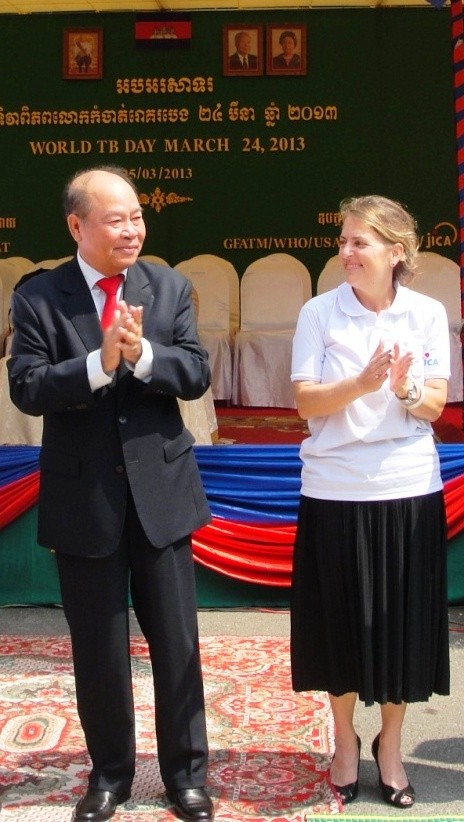Home » News & Information » Speeches » Remarks by Monique Mosolf, USAID/Cambodia, on World Tuberculosis Day
Monday, March 25, 2013
Subject
Commemoration of World Tuberculosis Day

Cambodian Minister of Health Mam Bunheng (left) and Monique Mosolf of USAID (right) commemorate World TB Day in Phnom Penh on March 25, 2013.
USAID/TB CARE I Cambodia
Remarks by USAID Office of Public Health and Education (OPHE) Director, Monique Mosolf
Phnom Penhm, Cambodia - March 25, 2013
• Your Excellency, Dr. Mam Bunheng, Minister of Health
• Your Excellency, Dr. Mao Tan Eang, Director of CENAT and Advisor to the Ministry of Health
• Your Excellency, Dr. Mean Chi Vun, Director of NCHADS and Advisor to the Ministry of Health
• Phnom Penh Municipal Governor
• Representatives of JICA and WHO
• Distinguished Guests, Ladies and Gentlemen
Despite significant progress towards tuberculosis control in the past decade, this disease continues to be a major challenge to the health of communities around the world. In 2011- the latest year for which estimates are available - there were 8.7 million new cases of TB and 1.4 million people died as a result of their illness. In Cambodia alone, 61,000 people are estimated to suffer from TB each year. 9,000 of those will die annually.
The good news is that Cambodia has shown the world what can be achieved when countries apply a concerted and relentless effort to fight disease. This effort brought Cambodia a 45% decrease in prevalence of TB between the 2002 and 2011. That is astonishing! I would like to congratulate the Royal Government of Cambodia and all of you on this great achievement and for your contributions to global tuberculosis control.
We should, however, remember that Cambodia continues to have one of the highest TB prevalence rates in the world. TB continues to survive, and even thrive, in more aggressive forms such as multi- and extremely drug resistant forms of TB. Addressing a problem of this magnitude will take decades and needs to remain a priority. I, therefore, urge you to sustain the momentum for the coming years so that the tremendous gains made in the past decade will not be lost.
This World Tuberculosis Day, we enter the second half of the two-year “Stop TB in my lifetime” campaign. As the campaign urges, each of us should join the effort to stop TB and more importantly, determine what we will do to make it happen. We can all play a part. It may be to raise awareness about TB with our friends and family. We could help TB patients in our community complete their treatment. Maybe some of us are in a position to advocate for greater commitment to and funding for the fight against TB.
The United States, through the Centers for Disease Control and USAID, is partnering with government, civil society and the private sector to harness the power of science, technology and innovation to deliver health services better and at lower cost. The U.S. government is also the largest donor to the Global Fund to fight HIV/AIDS, Tuberculosis and Malaria and a major contributor to the World Health Organization, Stop TB Partnership, and the Global Drug Facility. All provide important support, including live-saving drugs, to basic TB control worldwide.
USAID, too, is committed to continue its support to worldwide TB control efforts, including in Cambodia. With both our implementing and donor partners and strong leadership from the Ministry of Health, we will do our utmost to assist Cambodia in surmounting the obstacles to achieving the long term goal set by the Stop TB Partnership for the year 2050 – to eliminate TB globally! Let us use World TB Day to reflect on the progress that has been made and to renew our commitment and redouble our effort to fight TB in Cambodia.
Phnom Penh, Cambodia
Issuing Country
Related Speeches
- Remarks by Polly Dunford, Mission Director, USAID Cambodia, Launch Event of Feed the Future Cambodia Harvest II
- Remarks by Christina Lau, Deputy Director, Office of Public Health and Education, USAID/Cambodia, Opening Ceremony of the Kick-Off Workshop for “One Health Workforce”
- Remarks by Veena Reddy, Deputy Mission Director, USAID Cambodia, EPIC Showcase







Comment
Make a general inquiry or suggest an improvement.